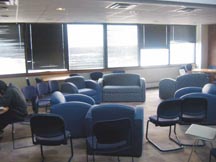Five CPCS students have taken it upon themselves to fill a void they see in their college. That void is not the curriculum or the staff, but in the internal cohesion of the College of Public and Community Service, and its relationship with the university as a whole.
Since last May, Junior Community Planning majors John Bartkow and Brad Stoler along with fellow students Sarah Colomba, Lenny Scoletta, and Tony Jacobs have been assembling research that they hope will culminate in the development of a student resource center; a physical meeting place where students and initiatives within CPCS can integrate with the university as a whole.
Although the students involved are receiving credit for their actions, Bartkow says that is not their primary motivation.
“We’re not just doing this to get credit. We really want to see something materialize,” he says.
The idea to create such a space, according to Stoler, was sparked by conversation with CPCS Experiential Learning Team Coordinator Diane Dujon. Stoler says that listening to Dujon’s accounts of the community involvement and integration of CPCS during her tenure as a student sparked an interest to revitalize the student body, create partnerships with other colleges, and showcase their work.
“This was not something that was initiated by our college, by our faculty, by our administration,” says Stoler. “This was something that was done by the students, for the students, students want this,” he continues.
According to Bartkow, the students involved began their research by analyzing assessments, services, and demographic information of the CPCS and cataloguing the university-wide resources in Student Life and other on-campus organizations.
They then administered in-class surveys to nearly 50 percent of the CPCS students and held three focus groups. 90 percent of the CPCS students surveyed and all students that participated in the focus groups reported both a desire and need for a student center within the college.
Bartkow and Stoler say that the institution of such a center would not only further the mission of the College of Public and Community Service, but that of UMB as a whole.
“A lot of CPCS students are working with Harbor Point, working with Dorchester youth, working within the community, and to have a central organization to bring these together so everyone can work in unison would be beneficial,” says Stoler.
Stoler and Bartkow hope that the proposed center would bring the same sense of community to the CPCS department that the addition of the campus center has brought to the larger university.
They continue that many CPCS students are on campus during the evening hours when many of the campus-wide resources are closed for the day. Bartkow says this center may act as a way to promote community among not only night students within CPCS, but allow a communal space for all those enrolled in night courses at UMB.
“A lot of people in our college are not informed about the different things that they have,” says Bartkow. “One of the points of this is to kind of bring in information from other colleges, from the campus center, and make it more easily accessible to be involved in different activities throughout the university,” he continues.
Stoler says that a resource center housed in the CPCS could help further the college’s mission of research and allow students and faculty to take advantage of the opportunities for inter-college collaboration.
“We want to work with the different institutes, because if you’re doing any type of research you need a geologist, you need a mathematician, you need a sociologist,” he says. “We want to start working with these people to do some quality research at the undergraduate level,” he explains.
Stoler sees this expansion of community and increased participation as a venue for increasing student retention as well as reputation. “When students see the great things we are able to do within our college for the university it will raise the standard, and the bar of the university as a whole,” he says.
The group hopes to fund their venture through grants, fundraisers, and alumni support.
All five students involved are coupling the realities of the center’s start-up with a Needs and Resource Analysis course in which they continue to learn the theories that relate to their project.
The group works under the guidance of CPCS professors Joan Arches and Luis Aponte-Pares. Stoler and Bartkow maintain that although the guidance of the professors has been useful for the process as a whole, they have allowed the students to continue ownership of the project by remaining hands-off.
The students remain optimistic as they prepare to submit a proposal for the resource center for administrative approval. They are excited for the opportunity for all their work and research to be realized, and are confident in the research they have submitted.
The group hopes that they will be allotted space for their center in Wheatley’s fourth floor lounge or the building’s former student senate offices to keep in proximity to the CPCS department.
An informational session will be held on Thursday, March 31 from 5-7 p.m. in the Wheatley lounge in the hopes of getting more feedback and student support around the project.
“We don’t want to go this alone, we want to sit down and get other people’s ideas and really figure out what exactly we need to do to fill in all those blanks for everyone. The more heads the better,” says Bartkow.
Anyone interested in becoming involved with the student resource center project can contact Brad Stoler at 508-641-9089 or send an email to [email protected].





















































